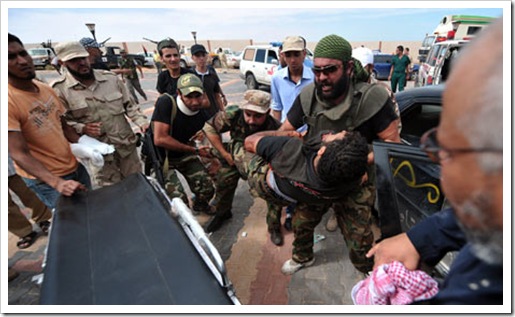SIRTE, Libya (AP) — With NATO warplanes circling overhead, revolutionary fighters battled block by block Saturday as snipers rained fire from rooftops in fierce street fighting in Moammar Gadhafi's hometown — the most important remaining bastion of support for the fugitive leader.
 The battle for Sirte is crucial because Libya's new leaders have promised to declare liberation after it is captured even though fighting continues elsewhere and Gadhafi remains on the run. That will allow them to move forward with setting a timeline for elections and establishing normalcy in the oil-rich North African nation.
The battle for Sirte is crucial because Libya's new leaders have promised to declare liberation after it is captured even though fighting continues elsewhere and Gadhafi remains on the run. That will allow them to move forward with setting a timeline for elections and establishing normalcy in the oil-rich North African nation.
Revolutionary forces launched a major attack on Friday, pushing into the Mediterranean coastal city from the west, east and south after a three week siege from the outskirts in which they said they were giving civilians time to flee.
Gadhafi forces also remain entrenched in the central city of Bani Walid, but the transitional leaders say they will declare liberation without it because Sirte's fall will give them control over all seaports and harbors.
British Defense Secretary Liam Fox pledged to keep up NATO airstrikes even after Sirte's fall, saying the international military action would continue as long as the remnants of the regime pose a risk to the people of Libya.
"We have a message for those who are still fighting for Gadhafi that the game is over, you have been rejected by the people of Libya," he told reporters Saturday in Tripoli.
Anti-Gadhafi forces met strong resistance as they pushed to within less than half a mile (kilometer) from loyalist fighters dug in around Sirte's Ouagadougou convention center and Green Square in fierce street fighting in the heart of the city.
Libya's de facto leader, Mustafa Abdul-Jalil, the head of the governing National Transitional Council, said the battle has been "ferocious," with 15 revolutionary fighters killed and 180 wounded on Friday.
"Our fighters today are still dealing with the snipers positioned on the high buildings and we sustained heavy casualties," he said at a joint news conference in Tripoli with Fox and Italian Defense Secretary Ignazio La Russa.
Suleiman Ali, commander for revolutionary forces, said loyalist forces have been driven away from Ibn Sina Hospital where hundreds of civilians have sought refuge from the fighting.
A military spokesman in Tripoli, Abdel-Rahman Busin, said he expected the city to be declared free in the next 24 hours.
"They've pretty much taken the city and it's just a few pockets of resistance," he said, adding snipers were still posing a major threat.
NATO warplanes flew overhead but no strikes were immediately reported.
Abdul-Jalil called on the international community to help Libyans treat the wounded, saying they could deduct the cost from Libyan assets that were frozen under Gadhafi's regime.
Sirte, 250 miles (400 kilometers) southeast of Tripoli, is key to the physical unity of the nation of some 6 million people, since it lies roughly in the center of the coastal plain where most Libyans live, blocking the easiest routes between east and west.
The international community has rallied around Libya's efforts to move forward with forming a new government, with transitional leaders promising elections within eight months after liberation is declared.
